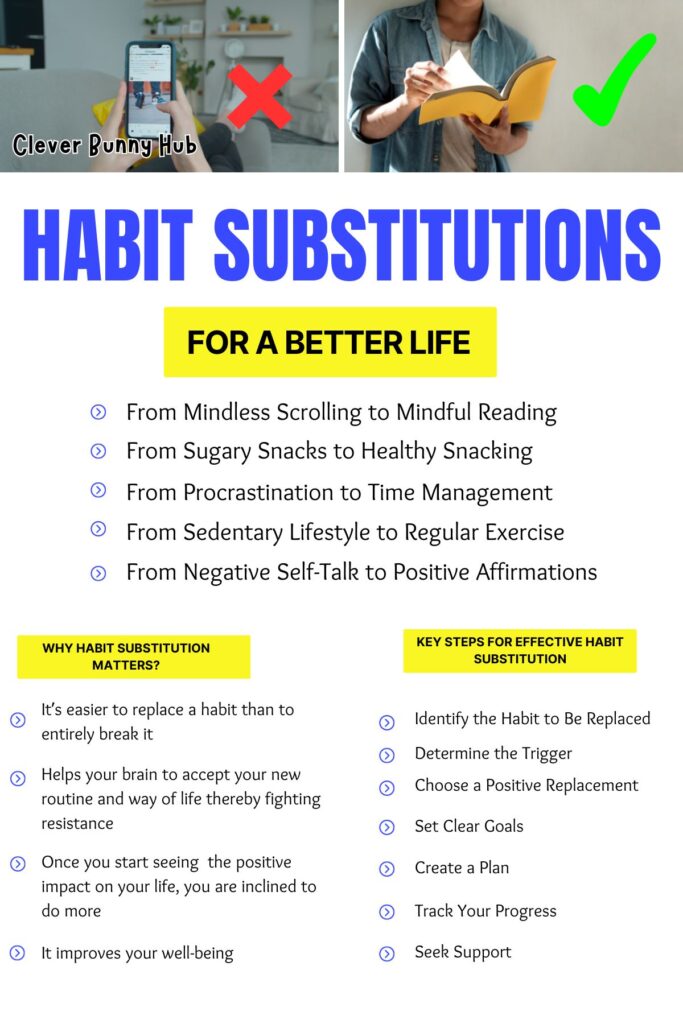Our lives are put together by our habits. They influence how we live our lives, behave, and eventually how our lives turn out. Our daily decisions are heavily influenced by the habits we’ve developed over time.
While certain habits are helpful, others can prevent us from reaching our objectives and leading the life we want. The good news is that we have the ability to alter our routines and thereby improve our lives. Habit replacement is one method that works well for this. The unseen threads that bind our daily lives together are our habits.
They direct our behavior, sway our decisions, and ultimately determine our fates. While some behaviors help us advance, others may impede our progress. Utilizing the power of habit substitutes is crucial if one wants to start living a better life.
The habits we develop affect the course of our lives. Whether we are aware of it or not, our everyday behaviors and routines have a significant impact on our happiness and general well-being.
The good news is that we have the ability to alter these habits and thereby improve our lives. Substituting new habits for old ones is a useful method for accomplishing this. We’ll go into the idea of habit replacement in this post, examining what it is, why it’s significant, and how you may use it to live a more contented and meaningful life.

Understanding habit substitution
Habit substitution is the process of replacing bad or ineffective habits with better, more advantageous ones. Rewiring your brain involves actively choosing to make choices that are consistent with your values and aspirations.
Habit replacement aims to replace the old habit with a new, healthier one rather than trying to completely break a poor habit, which can be difficult and demotivating. This strategy makes use of the brain’s propensity for habit and familiarity. Understanding the nature of habits is crucial before diving into the specifics of habit replacements.
Habits are automatic behaviors that we habitually engage in with little to no thought. Depending on their nature, they may be both advantageous and harmful. Finding and changing these habits is the secret to living a better life.

Why Habit Substitution Matters?
Habit substitution matters for several reasons:
1. Sustainable change:
This likely refers to lasting and meaningful changes in one’s behavior, lifestyle, or routines.
In various aspects of life, from personal health to environmental conservation, sustainable change implies adopting habits or practices that can be maintained over the long term, rather than temporary or short-lived modifications.
Sustainable modifications put your attention on long-term-maintainable practices. This means that rather than transient solutions, your life is more likely to undergo steady improvements.
According to behavioral psychology research, it’s frequently simpler to replace a habit than to entirely break it. Because of this, habit substitution is a more enduring method of transformation.
Because it addresses multiple dimensions of social influence, interpersonal connections, and personal well-being, sustained change in habit substitution is essential for a better life. It enables you to make consistent, wholesome decisions that, over time, result in a more contented and significant existence.
2. Less resistance:
The brain usually fights against sudden changes. By replacing a habit, you can work with your brain’s natural desire for routine and increase the likelihood that it will accept the new behavior.
Reducing resistance to habit substitution can significantly impact your ability to make positive changes and lead a better life.
It increases your chances of success, lowers stress, and fosters a more positive and enjoyable experience throughout the habit formation process. This, in turn, contributes to long-lasting and meaningful improvements in your life.
A positive feedback loop can be produced by reduced resistance. As you face fewer challenges, you’ll be more inspired to carry on achieving progress in your life, starting a cycle of continuous growth.
3. Positive reinforcement:
You achieve great results and strengthen your will to change when you effectively replace bad behaviors with good ones. Strong motivation to adopt and uphold new habits is provided by positive reinforcement.
Your motivation to keep up your new habit increases when you reap benefits or achieve your goals as a result of it. Your mood and general psychological health can be improved by receiving positive reinforcement.
A better quality of life might result from feeling successful and happy after receiving rewards and successful outcomes. Your self-efficacy, or confidence in your capacity to accomplish goals, is enhanced by success and other forms of positive reinforcement.
You gain confidence in your capacity to make healthy adjustments in your life as you see yourself succeeding at habit replacement.
4. Improved well-being:
Making positive lifestyle changes can enhance your physical and mental health as well as your general quality of life. The main result of habit replacement for a better life is enhanced well-being.
It takes into account all facets of your life physical, mental, emotional, and social, and promotes balance and contentment. You can live a better, healthier, and more satisfying life by setting priorities and achieving better well-being through habit substitution.
Ultimately, better life pleasure is a result of improved well-being. You’re more likely to feel a deep sense of fulfillment and contentment when you’re feeling good in every aspect of your life.

Key steps for effective habit substitution
1. Identify the habit to be replaced:
Finding the behavior you want to replace is the first step in the habit substitution process. Be explicit about the issue you’re attempting to solve, and be aware of the detrimental effects it has on your life.
Your goals become more clear after you identify the behavior you want to replace. It clearly states the particular pattern or behavior you want to change, leaving no space for doubt.
It enables you to focus your efforts on just one habit. It might be difficult and ineffective to try to break several behaviors at once. Your odds of success rise when you concentrate on one behavior at once.
2. Determine the trigger:
Every habit has a cue or trigger that causes it to begin. Determine what habits that you want to replace are triggered by. Is it a particular time of the day, stress, or boredom?
In order to successfully replace a habit, identifying the trigger is a crucial step. It enables you to choose an acceptable replacement habit while also assisting you in gaining insight into the habit’s root causes.
By dealing with triggers, you improve your chances of effectively replacing bad habits with healthier ones, which will ultimately result in a better life. Finding triggers helps with the long-term upkeep of habit replacement.
It makes it possible for you to remain alert and receptive to potential triggers, lowering the possibility of relapsing into the previous behavior.
Related Posts
3. Choose a positive replacement:
Choose a healthy behavior that you can replace the bad one with once you’ve determined the habit and its trigger. This new behavior ought to provide a more wholesome reaction to the same cause.
A crucial stage in successful habit substitution is selecting a constructive replacement habit. This increases your chances of success and helps you improve your quality of life overall by making sure you have a clear and advantageous replacement for the old habit.
The replacement habit should ultimately assist you in achieving the objectives you have set for yourself. It turns into a tool that serves a purpose and advances your overall health and personal growth.
4. Set clear goals:
Establish your intentions and goals for the habit replacement. What do you want this modification to accomplish? Having specific goals will keep you motivated.
Having specific objectives helps increase accountability. You are more likely to stick to your commitment to habit replacement when you keep yourself accountable or share your intentions with others.
Goals offer guidance and direction. They assist you in making judgments, taking actions, and making choices, which makes figuring out what steps to follow to get the intended result easier
5. Create a plan:
Create a strategy outlining the measures you’ll take to put the habit substitution into action. Divide the task into doable, everyday tasks.
A crucial stage in the process of successful habit replacement is developing a plan. It offers structure, direction, and a framework for change, boosting your chances of effectively swapping out bad habits for good ones and resulting in personal development and a better life.
As you reach milestones and advance toward your goal, each step in your plan offers a chance for encouraging feedback. Plans can be modified as conditions change because they are not inflexible documents.
If the results of your initial strategy are not what you were hoping for, you can change your strategy to make it more successful. Making a plan might assist you in visualizing the habit substitution process and the measures necessary to achieve it. Your dedication and motivation may be increased through visualization.
6. Track your progress:
To track your development, keep a notebook or use a habit-tracking app. Tracking gives you a record of your accomplishments and aids in keeping you accountable. Monitoring your development fosters self-awareness.
It promotes a deeper understanding of yourself by allowing you to observe your actions, attitudes, and feelings in relation to your old and new habits.
Related Posts
7. Seek support:
Tell your loved ones, a support group, or pals about your objectives. Having a support network can offer inspiration and responsibility. A key step in the process of successful habit substitution is seeking support.
It gives you access to useful tools, accountability, emotional support, and encouragement, all of which can greatly increase your odds of successfully changing your bad behaviors into good ones.
Support is helpful not just in the early phases of habit replacement but can also help you keep the new habit going in the long run. For changes to last, ongoing support and reinforcement are important.
When you ask for help, you include those who can hold you responsible for your commitment to habit reversal. You may be inspired to keep on track if you know that someone is aware of your objectives.
Encouragement and motivation can come from friends, family, or the community. Their trust in your capacity to change might bolster your self-assurance and resolve.

Examples of Habit Substitution for a Better Life
1. From mindless scrolling to mindful reading:
When you’re bored and find yourself mindlessly scrolling around social media, try substituting a daily reading schedule for this behavior. Bring a book or e-reader along so you can quickly switch from scrolling to reading whenever the urge strikes.
By encouraging personal development, expanding knowledge, sharpening focus, lowering stress, and encouraging a more attentive and deliberate attitude to daily tasks, “Mindless Scrolling to Mindful Reading” can help you live a better life. This change enhances not just your mental and emotional health but also has a favorable impact on many areas of your life.
Scrolling mindlessly can result in disorganized and disturbed thinking. Contrarily, attentive reading necessitates continued focus and attention, which improves your ability to concentrate and helps you stay more in the present.
Reading fosters analytical thinking, which helps you grow a more discerning and considerate approach to knowledge. Your daily decision-making and problem-solving skills will improve as a result of this habit.
2. From sugary snacks to healthy snacking:
A good habit modification that can result in greater physical and mental health, better self-control, and a higher quality of life is swapping out sugary snacks for nutritious ones. It’s a choice that promotes your long-term well-being and lays the groundwork for a life that is more vibrant and rewarding.
Consuming nutrient-dense foods like fruits, vegetables, nuts, and whole grains while snacking is often considered healthy. By switching, you give your body the critical vitamins, minerals, and fiber it needs, improving your overall health and lowering your risk of developing chronic diseases.
Sugary snacks can cause weight gain and obesity since they frequently include a lot of empty calories. On the other side, healthy snacking can aid in weight control by offering satiating and nourishing options that prolong your feeling of fullness.
3. From procrastination to time management:
Replace procrastination with efficient time management strategies if it is holding you back. To increase productivity, make to-do lists, assign due dates, and divide projects into smaller, more manageable segments.
Setting specific goals and allotting time specifically to work on them is made possible by time management. You’ll feel a sense of accomplishment and fulfillment as you make progress if you can overcome procrastination and constantly work toward your goals.
Putting off things often results in lost time and missed chances. By prioritizing work and maintaining focus, effective time management enables you to maximize your productivity, ultimately resulting in higher success.
Self-discipline is necessary for effective time management; it is a trait that carries over into other facets of life. The ability to regulate your actions and decisions better enables you to exercise self-control in a variety of spheres of your life.
4. From sedentary lifestyle to regular exercise:
A revolutionary behavior change that can improve physical and mental health, increase energy levels, and improve general well-being is replacing a sedentary lifestyle with regular exercise. It gives you the power to take charge of your health and live a more active, purposeful life.
Make daily physical activity a habit instead of leading a sedentary existence. As you gain fitness, start out slowly and progressively increase the duration and intensity of your workouts.
By making exercise a priority, you encourage those around you to follow suit. Your dedication to leading a healthy lifestyle can inspire loved ones to change for the better. Regular physical activity encourages a happier and more optimistic way of life. It can give your daily routine more happiness, meaning, and structure.
It feels good to set and attain fitness objectives, no matter how big or tiny. You may be inspired to pursue other goals in various spheres of your life by this sense of accomplishment.
5. From negative self-talk to positive affirmations:
Replace your negative self-talk and self-criticism with positive affirmations if you are prone to doing so. Consciously speak good things about yourself whenever you catch yourself becoming negative of yourself.
A strong habit modification that can improve relationships, self-confidence, self-esteem, mental health, and self-talk is replacing negative self-talk with positive affirmations. It gives you the ability to get rid of self-limiting thoughts and develop a happier, more resilient life.
By using powerful affirmations, you can take charge of your thoughts and beliefs. You start writing your own story, which gives you a sense of empowerment and personal agency. Your creativity and ingenuity might increase with an optimistic outlook.
When you have confidence in your skills, you’re more open to trying out novel concepts and taking creative chances.
A happier and more optimistic lifestyle can be achieved by substituting positive affirmations for negative self-talk. You become more aware of the good things in life and more tenacious when faced with difficulties.
Conclusion
Habit replacement is a potent technique for improving oneself and growing personally. You can make a long-lasting change in your life by identifying the habits that are limiting you and swapping them out for constructive alternatives.
Keep in mind that replacing a habit takes time and work, but the benefits are well worth it. Your everyday routine will gradually include these new habits, resulting in a better, more rewarding life that is consistent with your objectives and ideals. Start today, and as you make new choices, observe how your life changes.
Keep in mind that changing a habit takes effort and patience. Be kind to yourself and acknowledge minor accomplishments along the way.
You’ll find yourself on a transformative journey toward a life full of meaning, contentment, and happiness as you progressively replace old behaviors with new, more positive ones. Accept the power of habit replacement and observe how it leads you to a better future.




























